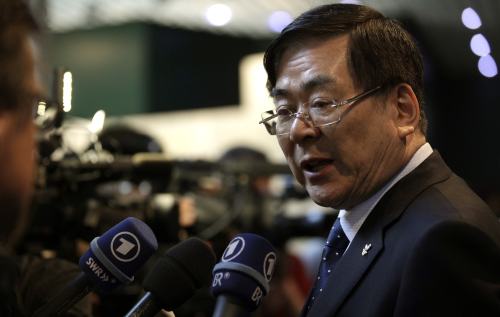The long battle to host the 2018 Winter Games is entering the final stage with just 30 days to go until the International Olympic Committee meets to choose the host city.
Can Pyeong-Chang become the second Asian country to host Winter Games, or will Munich become the first city to host both a Summer and Winter Olympics? Or is Anncey destined to bring the Games into the French Alps again?
Until recently, PyeongChang, making its third bid, has been considered the favorite to make it third time lucky, with Munich running closely behind and Anncey trailing behind.
Such predictions, however, changed after the 2018 technical briefing in May. The three candidate cities made their technical presentation to 89 members of the IOC in Lausanne, Switzerland.
Although all three bidders claimed that they made the best pitch, there was a sense in the air that Munich’s campaign, led by Tomas Bach, the IOC vice president, was gaining ground.
“The feedback on our presentation was very good. They let us feel that our bid has a realistic chance of winning,” Bach claimed after the meeting.
In Lausanne, Bach, who is considered a strong candidate to become the next IOC president, showed his charisma and appeal. And his message was clear, drawing unforced attention from the media.
Anncey, which started slowly, also received good feedback. In particular, French triple Olympic skiing champion Jean-Claude Kill’s presentation came over well.
In an interview with The Korea Herald, Cho Yang-ho, the CEO of PyeongChang bid committee admits that there is no clear front runner.
“It is difficult to say who can or can’t win the bid at the moment,” Cho said.
 |
PyeongChang bid chief Cho Yang-ho (Yonhap News) |
“It’s hard to predict. But I believe PyeongChang is not running behind other bidders,” he added, noting that the real battle was yet to start.
“The real race is from now until the final vote in July,” he said.
The 108-member IOC committee will cast a secret ballot on July 6 to decide the host of 2018 Winter Olympics. And it will be crucial that the candidate cities know that how to persuade each individual IOC members.
The first question they ask is which city will have the best Olympic legacy.
For the IOC members this time, the dilemma is whether to go to new territories in Asia or to places that have long winter sports tradition.
PyeongChang is building its case that it will open “new horizons” in Asia’s winter sports, while the German city is promising to bring “festive, full-stadium atmosphere,” and the French Alps town is pledging to provide the best game venues in the heart of the mountains.
The South Korean city still seems have a slight edge over other bidders in technical and financial aspects, but what is more important in the final battleground is personnel resources. This is where the Munich committee, led by the IOC vice president along with figure skating legend Katarina Witt, is considered the strongest.
Although South Korean figure star Kim Yu-na recently boosted PyeongChang’s campaign by making a presentation in Lausanne. Kim seems unable to match Witt’s political skills and ability to swing undecided IOC votes.
But PyeongChang bid chairman Cho insists he has learned from the past. The Gangwon Province city lost narrowly to Vancouver for the 2010 Games and Sochi for the 2014 Games.
Asked what he has learnt from the two previous failures, Cho said: “I don’t think it was a failure. From the last two bids, we proved that we were capable of hosting the Games. And we’ve developed a much stronger bid.”
“Now we’re trying to prepare for our best presentation in Durban” he added.
The race to host to 2018 Winter Olympics is often compared to a marathon. What is important is not who is leading now, but who finishes first. The final victor will emerge at the IOC session in Durban on July 6.
By Oh Kyu-wook (
596story@heraldcorp.com)


![[Weekender] AI is silently changing our work: 7 professionals share how](http://res.heraldm.com/phpwas/restmb_idxmake.php?idx=644&simg=/content/image/2024/11/07/20241107050847_0.jpg)





